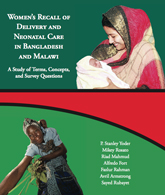Qualitative Research
The DHS Program supports qualitative research to produce informed answers to questions that lie outside the purview of a standard survey approach to understanding issues in health, population, and nutrition. By using a qualitative approach to examine the social and cultural contexts of daily life, The DHS Program works to increase the validity and reliability of its surveys, to expand the information available for monitoring and evaluation, and to contribute original qualitative research in the fields of anthropology, demography, and public health. The capability to collect data through qualitative as well as quantitative methods provides a unique opportunity to learn and demonstrate how quantitative and qualitative approaches can be linked to expand our understanding of social and cultural dynamics related to health, population and nutrition around the world.
The strategy for designing and conducting qualitative research within The DHS Program draws on recent advances in qualitative research methods in anthropology and sociology. It makes connections between theory and everyday events in research designs and emphasizes the ways that qualitative and quantitative approaches to the study of social interaction can complement one another. This strategy focuses on local terms, concepts and practices to achieve understanding, and explores the social and cultural contexts within which events occur. Qualitative research can be used to examine social and cultural dynamics in areas such as family planning, reproductive health, HIV/AIDS, child health, and adult health. The ultimate goal of this research is to inform policy and advise development programs that work with issues in health, population, and nutrition.
The DHS Program responds to requests for designing a qualitative or a mixed method study to answer specific program or policy questions from USAID Washington, from USAID Missions, from collaborating agencies, and from other organizations. DHS staff designs qualitative studies in collaboration with clients, identifies local partners to conduct studies, directs the analysis and report writing, and communicates the findings to stakeholders. Studies may also be designed in relation to a DHS survey to improve the way questions are asked and how answers are coded, provide contextual information for implementing a survey, or further interpret DHS findings.
The techniques of qualitative research available for data collection vary widely, including observations, participation, rapid assessment procedures, various types of individual or group interviews, personal narratives, focus group discussions, and content analysis of medical records and other documents. Data analysis and report writing is carried out by experienced anthropologists working with colleagues familiar with local contexts. Among the topics examined by DHS through qualitative research are:
- Women’s reproductive health issues
- Female genital cutting in African countries
- Nutrition of young children
- Voluntary Counseling and Testing for HIV
- HIV and AIDS and antiretroviral therapy
- The contribution of alcohol to HIV transmission
- Women’s recall of events around birth and newborn care
